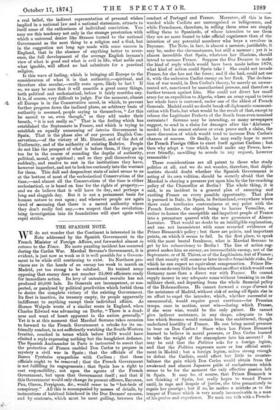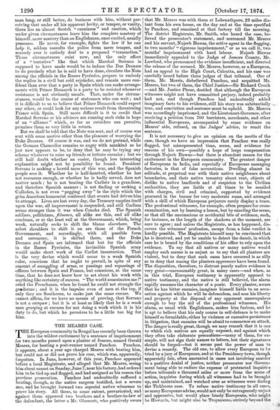THE SPANISH NOTE.
WE do not wonder that the Continent is interested in the Note addressed by the Spanish Government to the French Minister of Foreign Affairs, and forwarded almost in extenso to the Times. No more puzzling incident has occurred during the Carlist War. Marshal Serrano's Government, it is evident, is just now as weak as it is well possible for a Govern- ment to be while still continuing to exist. Its Northern pro- vinces are in the hands of an enemy too weak to march on Madrid, yet too strong to be subdued. Its trained army opposing that enemy does not number 35,000 efficients ready for immediate action. Its levy of untrained recruits has not produced 40,000 lads. Its Generals are incompetent, or sus- pected, or paralysed by political proclivities which forbid them to desire the complete victory of the existing Government. Its fleet is inactive, its treasury empty, its people apparently indifferent to anything except their individual affairs. As Horace Walpole wrote of a similar scene in England, when Charles Edward was advancing on Derby, " There is a dead- ness and want of heart apparent in the nation generally." Yet it is at this moment that Marshal Serrano takes occasion to forward to the French Government a rebuke for its un- friendly conduct, in not sufficiently watching the South-Western frontier, couched in terms which before 1870 would have elicited a reply expressing nothing but the haughtiest defiance. The Spanish Ambassador in Paris is instructed to assert that the protection of France enabled Don Carlos to prepare in mystery a civil war in Spain ; that the officials of the Basses Pyrenees sympathise with Carlism ; that these officials ought to be removed ; that the French Government is not fulfilling its engagements ; that Spain has a right to cast responsibility, not upon the agents of the French Government, but upon that Government itself ; and that if this Government would only change its present officers, Bayonne, Pan, Oleron, Perpignan, &c., would cease to be " hot-beds of conspiracy." All this is accompanied by masses of details, by insinuations of habitual falsehood in the Due Decazes' excuses, and by contrasts, which must be most galling, between the
conduct of Portugal and France. Moreover, all this is for- warded while Carlists are unrecognised as belligerents, and while Frenchmen, therefore, in selling them arms are simply selling them to Spaniards, of whose intention to use them they are no more bound to take official cognisance than of the intention of any potential murderer who buys a revolver in Bayonne. The Note, in fact, is almost a menace, justifiable, it may be, under the circumstances, but still a menace ; yet it is almost incredible that Spain, whatever her illusions, should intend to menace France. Suppose the Due Decazes to make the kind of reply which would have been made before 1870, what kind of action could Spain take ? She could not invade France, for she has not the force; and if she had, could not use it, with the unbeaten Carlist enemy on her flank. The declara- tion of war would, in Don Carlos's theory, be merely an unwar- ranted act, sanctioned by unauthorised persons, and therefore a further treason against him. She could not divert her small army for an expedition to Algeria, where an army equal to twice her whole force is cantoned, under one of the ablest of French Generals. Madrid could no doubt break off diplomatic communi- cation with Paris, but what would be the result of that, except to release the Legitimist Prefects of the South from even nominal restraints ? Serrano may be intending, as many newspapers suggest, to send in a claim for damages after the ' Alabama.' model ; but he cannot enforce or even prove such a claim, the mere discussion of which would tend to increase Don Carlos's chances of success. Or finally, he may really hope to move the French Foreign Office to exert itself against Carlism ; but then why adopt a tone which would make any Power, how- ever friendly, unwilling to accede to any request, however reasonable ?
These considerations are all patent to those who study politics at all, and we do not wonder, therefore, that diplo- matists should doubt whether the Spanish Government is acting of its own volition, should be secretly afraid that the Marshal is obeying a pressure put upon him by the far-reaching
policy of the Chancellor at Berlin The whole thing, it is said, is an incident in a general plan of annoying and exciting France on every possible opportunity. That plan is pursued in Italy, in Spain, in Switzerland, everywhere where there exist territories conterminous at any point with the French frontier, the object being to harass Versailles, or rather to harass the susceptible and impatient people of France into a premature quarrel with the new governors of Alsace- Lorraine. That would no doubt be an intelligible explanation, and one not inconsistent with some recorded evidences of Prince Bismarck's policy ; but there are points, and important points, on which it seems to fail. In the first place, to speak with the most brutal frankness, what is Marshal Serrano to get by his subserviency to Berlin ? The line of action sug- gested makes him an enemy, an irreconcilable enemy, not of the Septennate, or of M. Thiers, or of the Legitimists, but of France; and that enmity will sooner or later involve formidable risks, for which he can expect no equivalent compensation. Prince Bis- marck can do very little for him without an effort which would cost Germany more than a direct war with France. He cannot supply money in any adequate sums without breaking in on the military chest, and departing from the whole financial policy of the Hohenzollerns. He cannot forward a corps d'armie to the assistance of Madrid, without risk of seeing all Spain rise in an effort to expel the intruder, which, whether successful or unsuccessful, would require great exertions—for Prussian troops, once in motion, must win—during which France, if she were wise, would be the only gainer. He cannot
give indirect assistance, in any shape, adequate to the loss which Serrano would sustain from the embittered, though undeclared hostility of France. He can bring moral pressure to bear on Don Carlos ? Since when has Prince Bismarck learned to believe in moral pressure, or Don Carlos learned to take the weight of the atmosphere into his account ? It
may be said that the Politica asks for a foreign legion, and that the Politica expresses more or less official senti-
ment in Madrid ; but a foreign legion, unless strong enough to defeat the Carlists, could effect but little to counter- balance the gain which Don Carlos would obtain from the awakened and almost Japanese pride of exclusiveness which seems to be for the moment the only effective passion left in Spain. It may be, of course, that Prince Bismarck is not thinking of Spain, but really hopes to wound France until, in rage and despair of justice, she tries prematurely to regain her prestige ; but if so, he makes a mistake as to the temper of France which is very nearly inconceivable in a man of his genius and experience. No man can talk with a French- man long, or still better, do business with him, without per- ceiving that under all his apparent levity, or temper, or vanity, there lies an almost Scotch " canniness " and caution, which
under circumstances leave him the complete mastery of himself, more mastery than an Englishman, once excited, usually possesses. He never, for example, fights the law if he can help it, seldom assaults the police from mere temper, and scarcely ever is entirely deaf to a proposed " transaction." Those circumstances exist now, and the only effect of a " tentative " like that which Marshal Serrano is supposed to have made would be to induce the Due Decazes to do precisely what he is said to have done, circulate the Note among the officials in the Basses Pyrenees, prepare to embody the replies in a civil but cold rejoinder, and remain more con- -Mont than ever that a party in Spain which can make arrange- ments with Prince Bismarck is a party to be resisted whenever resistance is not obviously unsafe. That, under the circum- stances, would be the course of statesmen who can wait ; and it is difficult to us to believe that Prince Bismarck could expect any other, or could look for any serious result from threatening France with Spain. Still more difficult is it to credit that Marshal Serrano or his advisers are running such risks in hope of an " affiance " which, as far as outsiders can perceive, promises them so very little in return. But we shall be told that the Note was sent, and of course was sent with some motive other than the pleasure of worrying the Duke Decazes. Of course it was, and we do not pretend, while the German Chancellor remains as angry with mankind as he just now appears to be, to deny that he may be trying any scheme whatever to raise up friends or irritate enemies ; but we still half doubt whether an easier, though less interesting explanation might not by possibility be found. President Serrano is making a horrid mess of this war, and the Spanish people sees it. Whether he is half-hearted, whether he has not resources enough, or whether he is badly served, does not matter much ; he is not beating the Carlists in a grandiose, and therefore Spanish manner ; is not finding or seeking a Culloden, is not even "pegging away" in the style which the grim American humourist confessed that events had driven him to attempt. Lives are lost every day, the Treasury empties itself upon the war, all improvement is suspended, and still Carlism seems stronger than it was when Concha died. The Spanish soldiers, politicians, jkin,eurs' all alike see this, and all alike condemn, or at the least rail at the Government, which, being weak, naturally seeks to shift the blame elsewhere. The safest shoulders to shift it on are those of the French Government, and accordingly, with all possible form and ceremony, it is shifted there, and the Duke Decazes and Spain are informed that but for the officials in the Basses Pyrenees, the invincible Spanish army would make short work of the Carlist insurrection. That is the very device which would occur to a weak Spanish ruler, conscious that he ought to prevail, in spite of any amount of smuggling of arms, or passings and repassings of officers between Spain and France, but conscious, at the same time, that he does not know how to set about his work with anything like certainty of success. " The world assassinates me !" cried the Frenchman, when he found he could not strangle the gendarme ; and it is the impulse even of men at the top, if only they are Southern, to make just the same excuse. We cannot affirm, for we have no means of proving, that Serrano is not a catspaw ; but it is at least as likely that he is a weak man grasping at excuses for not doing a work which it is his duty to do, but which he perceives to be a little too big for him.



































 Previous page
Previous page